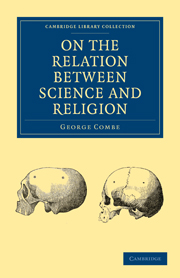Book contents
- Frontmatter
- Contents
- ADVERTISEMENT
- INTRODUCTION
- CHAP. I On the present state of the relation between Science and Religion
- CHAP. II Definition of the words Science and Religion, and Elucidation of the complex character of Religion
- CHAP. III Of Man
- CHAP. IV Of the extent to which Man is able to discover the Ultimate Elements or Essence of the External World
- CHAP. V Of God
- CHAP. VI Can we trace Divine Government in the Phenomena of the Physical and Moral Worlds? And if so, by what means is it maintained and rendered efficient?
- CHAP. VII Historical Evidence that the Divine Government of Nations is Moral
- CHAP. VIII Is this World, such as it now exists, an Institution?—Or is it the Wreck of a better System?
- CHAP. IX Practical Considerations
- CHAP. X Conclusion
- APPENDIX
CHAP. II - Definition of the words Science and Religion, and Elucidation of the complex character of Religion
Published online by Cambridge University Press: 29 August 2010
- Frontmatter
- Contents
- ADVERTISEMENT
- INTRODUCTION
- CHAP. I On the present state of the relation between Science and Religion
- CHAP. II Definition of the words Science and Religion, and Elucidation of the complex character of Religion
- CHAP. III Of Man
- CHAP. IV Of the extent to which Man is able to discover the Ultimate Elements or Essence of the External World
- CHAP. V Of God
- CHAP. VI Can we trace Divine Government in the Phenomena of the Physical and Moral Worlds? And if so, by what means is it maintained and rendered efficient?
- CHAP. VII Historical Evidence that the Divine Government of Nations is Moral
- CHAP. VIII Is this World, such as it now exists, an Institution?—Or is it the Wreck of a better System?
- CHAP. IX Practical Considerations
- CHAP. X Conclusion
- APPENDIX
Summary
In an enquiry into the relation between science and religion, it is necessary to define what is meant by these terms. By science, then, I understand a systematic exposition of correctly observed facts concerning the constitution, qualities, modes of action, and relations of the objects of nature.
It is unnecessary to enlarge on the definition of science; but, as much obscurity exists with respect to the nature and objects of religion, it may be useful to enter more fully into an elucidation of this subject.
It is generally acknowledged that there is a distinction between the emotional and intellectual faculties of men, but the mind being considered by many persons as a single power, the distinction is, in their view, one of nomenclature merely. Phrenological observations lead to a different view.
There is in the brain an organ for each primitive emotion, and one for each primitive intellectual faculty. And not only are these organs distinct from each other in space, but the natural vigour of each emotion, and of each intellectual power, depends on the size and condition of its organ.
Religion is not a product of intellect alone. No kind, quantity, or quality, of intellectual conceptions, will generate religious emotions. On the other hand, the religious emotions which prompt us to reverence and adore, cannot reach definite objects without the aid of the intellectual powers. These objects, also, may be physical or mental.
- Type
- Chapter
- Information
- On the Relation Between Science and Religion , pp. 15 - 22Publisher: Cambridge University PressPrint publication year: 2009First published in: 1857



